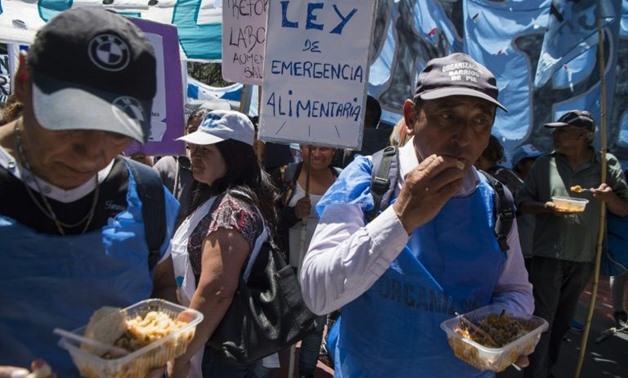
People receive meals from a soup kitchen amid demonstrations outside Kirchner Cultural Center in Buenos Aires, where Argentina's President Mauricio Macri delivered his speech - AFP
BUENOS AIRES – 31 October 2017: Argentina's President Mauricio Macri called on business and union leaders to put aside their differences and back his government's planned economic and social reforms in a speech Monday.
Macri pledged his government would maintain "austerity and order in the public accounts," as well as favor employment, reduce taxes, lower inflation, punish corruption and strengthen Argentina's institutions.
"I call on you to achieve basic consensus to draw a roadmap that gives us stability, and deliver a more just and integrated Argentina," he said, addressing an audience of 170 mostly politicians, business executives and union leaders in Buenos Aires.
"We are entering a state of permanent reformism," he told them.
However, the 68-year-old president gave no details of how his center-right government planned to carry out its program.
Instead he said, "We have concrete proposals that we will give in the coming months."
Macri's center-right Cambiemos or "Let's Change" coalition emerged from mid-term elections last week with a strengthened mandate for its reform program -- but still fell short of an overall majority in Congress, where it depends on alliances with leftist groups to pass laws.
The three axes of the reforms, according to Macri, will be "fiscal responsibility, creating more employment and institutional quality."
The speech came as International Monetary Fund (IMF) officials gathered in Buenos Aires to begin a review of the economy, having already recommended that Macri make adjustments to taxation.
Argentina's inflation is currently running at 18 percent, confounding Central Bank efforts to maintain it between 12 and 17 percent this year.
Unions protested against the government's program in the streets surrounding the Kirchner Cultural Center building where Macri was speaking.
Protesters demanded that the government pass an "economic emergency" law that would release increased subsidies to unprotected sectors.
Protest leader Juan Grabois said workers were being excluded from the country's "very biased debate" on the economy.
"We want state policies. But at no time should the basic rights of workers be punctured," one of the leaders of the main CGT union, Hector Daer, told a news conference.
Elected in 2015 on a pledge to reboot South America's third-largest economy, Macri has won praise from the markets as well as the US and key European economies for his efforts to rein in spending after 12 years of Peronist rule.

Comments
Leave a Comment